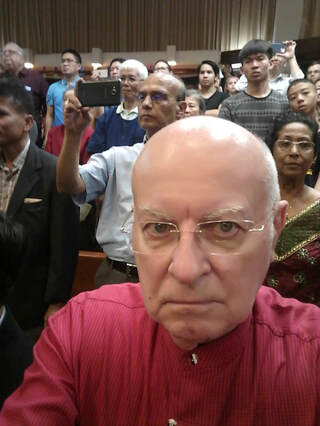|
THE TOP 9 REASONS THE CHURCH IS DECLINING
1. Gen X has withdrawn because church services are boring. 2. Churches are not valuable because they are not doing anything for the world and for people that can't be done better outside the church. 3. Conservative churches, especially nationalistic ones, have distorted Christianity. 4. Sexual malpractice and worse (as well as cover-ups) by clergy have driven people away. 5. The church's unrenounced history of suppression of minorities has exposed the church's hypocrisy. 6. The church continues to reject many spiritual practices that people have found valuable. 7. The church is no longer a social space where people expect to intersect with those who they think it might be important to know. 8. The central narratives, including those in the Bible, have lost relevance and no longer seem "all that important" to have children learn. 9. Being a church member is no longer central to one's identity. THE CHURCH DOESN'T MATTER enough to retain as many people as it used to do.
1 Comment
WOMEN ARE NOT AS DISTINCT AS THEY USED TO BE
The New York Times published a passionate, thought-provoking opinion article the other day that argued women are being ‘erased’ and discounted not only by the political right wing (who want women back in ‘their place’) but also by the left (who want to replace the term “women” with some other term such as “people with vaginas” or “those who menstruate”) and thus they would do away with decades of struggle for equality for women. “Woman” is a valuable term for an identifiable population, the author argued. Ah, ha! There are multiple struggles going on these days. Advocacy movements are in a growth phase. It has dawned on me as we are celebrating successful PRIDE events and decrying the threats posed by the US Supreme Court, that one characteristic of these human rights movements – as they appear online and in the media, at least – is their exclusionary bent. Each of them tries to draw distinct boundaries in order to make it crystal clear who is included and who is being excluded, who is being advocated and threatened and by whom. So, we have grown aware of our distinctions. We have gone from being merely “gay” to LGBT and now on to being LGBTQIA with a + to signal our openness to still more awareness. In some places we add “2S” for two-spirit people, and here I habitually add K for “kathoey” (people aware of their third gender identity). Our banner has grown from its rainbow stripes into much more complicated patterns as well. This is in the commendable effort to be fair and to articulate distinctions. What makes US distinct, we might say, is that we are different from confirmed, satisfied, confident, cisgender heterosexuals. We are not like them in very important ways, and they do not like us so there is a war going on between them and us as we pridefully march. But then we notice that Q not only stands for “queer” which we have proudly reclaimed but also for “questioning” (maybe there should be 2 Qs, but it’s getting unwieldy). In short, we’re pretty sure about a few of us and a little unsure about others. These distinctions we are insisting upon are not as precise as they need to be if we’re going into battle over them. Take the I (intersex), for example. Some I people profess emotional / romantic attraction and sexual preference for those who manifest as males, some for females, some for both (they are I and B), and some for none (they are I as well as A). See the overlap? Some bisexual persons prefer to call themselves pansexual, whereas others abhor the idea that “pansexual” could include those who seek sex with little children, or dead bodies, or sheep. These 3 have established terms: pedophile, necrophile, and zoophile. We are fairly OK with them being excluded from our list of companions. It also turns out that many pansexuals are bisexuals who object to something implied by the “bi” part. Oh, my. I have come to believe that we make a mistake when we try to be clear and exclusive. Every one of our categories overlaps parts of other categories. The attempt to do scientific compartmentalization has its down side. It only works when we can isolate a set of characteristics, DNA for example. Human intelligence (IQ) can be determined to an extent that makes it meaningful for certain determinations, such as whether an individual should be held accountable for some action of legal consequence. But IQ cannot help suggest the cause of every human behavior or even the value of the human individual, as some early 20th century eugenics projects tried to do. Human sexuality has no set of characteristics that can be isolated from all other aspects of human nature. If we have learned anything in the past 50 years it is that human sexuality is complex. In the 1980s we were looking for a gay genetic causality. By 1990 we knew there is no gay gene or chromosome. Part of sexuality is developed, not organically, but in the same way as one’s story is developed. Romance is narrative. “Narrative-influence” exerts enough power to convince some people that their same-sex activities are irrelevant to their identities. Their cisgender bias is not disturbed. For others, a same-sex experience might be profound, changing their self-understanding. But whether that new understanding is affirming and positive or destructive and threatening is a matter of how one’s narrative goes forward. And that is based on all the stored experiences (i.e., stories) that led up to this experience. The mind works on an experience and concludes “that was a punishment,” or “that was an exception of no consequence,” or “that means something.” Things like that. Romance is an internalized insight. Romance is also social. It is about a relationship. So, it involves how one succeeds or fails to express and respond to characters in a romantic story. It involves how the other person (or persons) participates and reacts. Even when one of the participants is passive because of need or rape, the perpetrator’s action is part of his or her ongoing story. It is never one thing and never simple. It would be better if we accepted how transitional our understanding is. Does this mean I think the opinion in the New York Times is right? Is feminism being undermined by its former allies? My “ah-ha” about this is that “women” is a term for a group that overlaps other groups to some extent. The way to accomplish equality was through an Equal Rights Amendment to the US Constitution, we thought, and we fought for it. Now we have new perspectives brought by greater awareness of diversity. The way to achieve equality is not by doubling down on gender definitions but to recognize how they fail to describe reality. “Men and women” is a flawed binary. Can you pick out the "women" in the picture accompanying this essay? They all attended Chiang Mai PRIDE 2022. Are all of them women, or just some of them? Careful, careful. Having said that, I admit I don’t know of a society that is ready to dispose of its binary thinking. So, it is too soon to hope for an end to the polarization that results from sub-dividing human beings into boxes and categories. But it helps me to try to wrap my mind around a few things: 1. Nobody is any one thing, even if they think they are. 2. A person’s sex is more than the sum-total of their anatomical components. 3. Anything that can be said about a person has exceptions and the more persons you are talking about the smaller the area of things they have in common. 4. Girls are not fully developed women when they first menstruate and boys do not turn into men in a single day. 5. A human right is a philosophical concept before it is a political decision. 6. Human progress toward greater inclusiveness is not without interruptions and never to be taken for granted. |
AuthorRev. Dr. Kenneth Dobson posts his weekly reflections on this blog. Archives
March 2024
Categories |
| Ken Dobson's Queer Ruminations from Thailand |
|


 RSS Feed
RSS Feed
